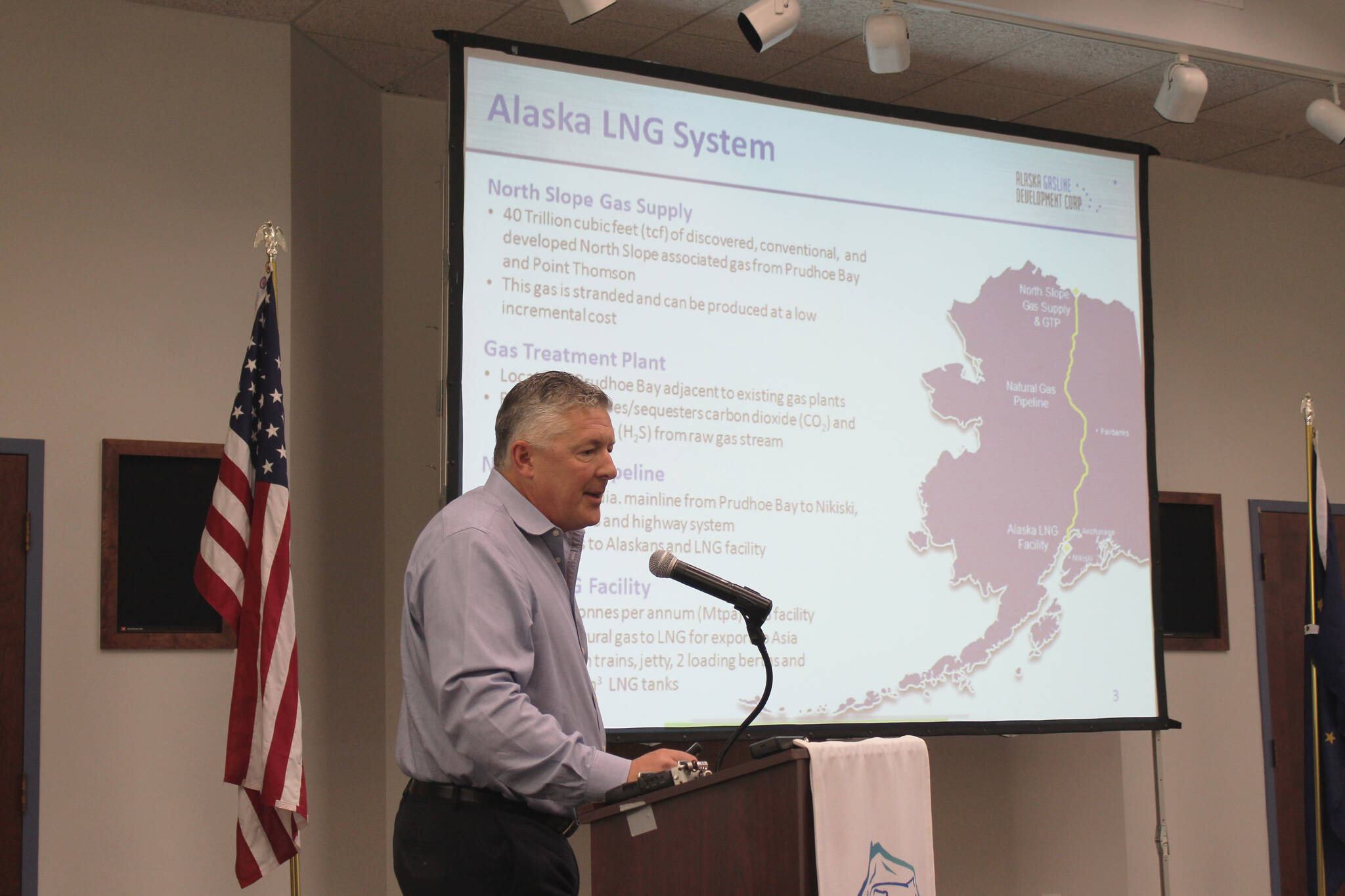A handful of environmental conservation groups that oppose the proposed Alaska Liquefied Natural Gas Project on Friday announced their latest move in a yearslong legal back-and-forth with the U.S. Department of Energy.
The groups — which include the Sierra Club and the Center for Biological Diversity — are appealing a department ruling handed down in June, which upheld the department’s 2020 approval of oil and gas exports from the long-awaited pipeline project.
The Alaska LNG Project would move gas from the North Slope through an 800-mile pipeline to a liquefaction plant in Nikiski for shipment overseas. After Russia’s 2022 invasion of Ukraine, project proponents described a unique window of opportunity to get the project done, as countries divesting from Russian oil began looking elsewhere for energy resources.
Alaska’s Congressional delegation, including U.S. Sens. Lisa Murkowski and Dan Sullivan, as well as voting bodies on the Kenai Peninsula were quick to throw their support behind the revived interest. Among the benefits, they say, are new jobs and economic development for the peninsula, a new source of oil and gas for Alaskans and the potential to meet a new global demand.
Murkowski told the Clarion earlier this month that the Alaska LNG Project is in a “good place,” regarding federal permits, but that her office is still working to secure funds. Specifically, Murkowski said she’s working to secure a federal loan guarantee for the project, which is expected to cost between $40 billion and $50 billion.
Opposition has been swift, however, from local and national environmental groups, who have criticized new investment in fossil fuels, expressed skepticism toward new global oil and gas demand and lambasted the potential environmental harms of the project, which they say threaten, among other things, endangered Cook Inlet beluga whales.
At a June meeting held in Kenai by the Alaska Gasline Development Corporation, however, attendee feedback was mixed. Some who spoke said the pipeline would bring needed economic opportunities to the peninsula and free up more resources, while others shared environmental concerns and questioned the corporation’s enlistment of Goldman Sachs to help secure project funding.
The Sierra Club’s opposition to the project goes back to 2020, the year the Department of Energy first greenlit exports from the project.
The Sierra Club in September 2020 requested a rehearing of the department’s approval of project exports. The organization argued that the Department of Energy Violated the National Environmental Policy Act by relying on an environmental impact statement that didn’t evaluate the impacts of producing the gas that would be exported.
The Department of Energy in April 2021 granted the Sierra Club’s request for a rehearing to allow two Alaska-specific environmental studies to be conducted. The additional studies generated a second project environmental impact survey, called the supplemental environmental impact survey.
The department in April 2023 upheld its approval of Alaska LNG exports, saying that the results of the studies didn’t change its belief that project exports are in the public interest.
“Upon review, DOE finds that the environmental impacts presented in the Final (supplemental environmental impact survey) are not sufficient to alter DOE’s determination under NGA section 3(a) that exports of LNG from the proposed Alaska LNG Project to non-FTA countries are not inconsistent with the public interest, as set forth in the Alaska LNG Order (Order No. 3643-A) issued on August 20, 2020,” the April 13, 2023, order says.
The two studies did prompt the department to newly require that Alaska LNG, as part of a monthly report, certify that natural gas produced by the project for export did not, during the previous month, emit carbon dioxide into the atmosphere “unless required for emergency, maintenance, or operational exigencies” and in compliance with the department’s order.
Then in May, the Sierra Club, along with the Center for Biological Diversity and Cook Inletkeeper, requested another rehearing on the April approval. In seeking another rehearing, the groups, among other things, pushed back against the Department of Energy’s claim that Alaska LNG exports are consistent with the public interest, calling that determination “arbitrary and capricious.”
The groups also argued the department’s final supplemental environmental impact survey did not comply with the National Environmental Policy Act.
The Department of Energy in June denied the request for a rehearing and refuted each of the claims made by the Sierra Club and the Center for Biological Diversity.
“DOE’s statement of purpose and need more than meets the standard of reasonableness, and Intervenors mischaracterize this requirement to fit their aims, not that of NEPA,” the June 14 order says regarding the groups’ “arbitrary and capricious” argument.
The three environmental groups on Friday announced that they are appealing that denial, with leaders from each reiterating their collective position in a press release.
“There is no demonstrated global market need for these exports and by 2030, the earliest date this project can expect to begin exporting liquefied methane gas, interest in gas will have waned,” Sierra Club Alaska Chapter Director Andrea Feniger is quoted as saying in the release. “DOE has unlawfully ignored the project’s environmental harms and underestimated its climate impacts. If this project moves forward, Alaska will be left to deal with a stranded asset and the ever worsening impacts from climate change.”
A full docket of legal action taken regarding the Department of Energy’s approval of Alaska LNG exports can be found at energy.gov/fecm/articles/alaska-lng-project-llc-fe-dkt-no-14-96-lng.
Reach reporter Ashlyn O’Hara at ashlyn.ohara@peninsulaclarion.com.
CORRECTION: A previous verion of the story incorrectly identified Cook Inletkeeper as one of the groups appealing the Department of Energy’s June denial of a rehearing. Cook Inletkeeper participated in the May request for a rehearing, but is not appealing the department’s ruling. The Clarion regrets the error.

